Mastodon
description: free and open-source, self-hosted, and federated social network service
13 results

Enshittification: Why Everything Suddenly Got Worse and What to Do About It
by
Cory Doctorow
Published 6 Oct 2025
What’s more, a rule that required social media platforms to facilitate their users’ painless departure would be extremely easy to administer, without any of the fact-intensiveness that makes anti-harassment rules so cumbersome. Mastodon, for instance, is a federated alternative to Twitter and Facebook. Signing up for a Mastodon server yields a familiar experience: you follow the people you want to hear from, and when they post something, you see it, in a timeline that puts the most recent posts first. You can create thematic lists of accounts (e.g., “journalists,” “artists,” “friends”) and tune in to just a few feeds. You can exchange direct messages with others and post your own words, pictures, and videos. The thing that makes Mastodon federated is that there are lots of Mastodon servers, with all kinds of management structures: some are co-ops, some are nonprofits, some are run by hobbyists, and some are run by businesses.
…
The thing that makes Mastodon federated is that there are lots of Mastodon servers, with all kinds of management structures: some are co-ops, some are nonprofits, some are run by hobbyists, and some are run by businesses. Meta’s Threads is a Mastodon server, and Truth Social, Donald Trump’s social media platform, is also a Mastodon server (more on this in a moment). By default, Mastodon servers are designed to exchange messages with one another in the same way that, say, email servers do. You can send an email from your Gmail address to a work colleague on an Outlook address, cc’ing an old friend from university using a northeastern.edu address, as well as your weird computer-savvy buddy who runs their own email server on a domain like craphound.com.
…
You can send an email from your Gmail address to a work colleague on an Outlook address, cc’ing an old friend from university using a northeastern.edu address, as well as your weird computer-savvy buddy who runs their own email server on a domain like craphound.com. (That’s my personal domain—it’s a long story.) In the same way, you can sign up for one of the big Mastodon servers like mastodon.social (a server run by the nonprofit, open-source group that maintains the code for Mastodon) and follow me (on mamot.fr, a server run by the French digital rights group La Quadrature du Net), as well as the news source ProPublica (on newsie.social, a server for news publishers); my fellow Farrar, Straus and Giroux author James Gleick (on mas.to, which relies on donations); and the computing legend Tim Bray (on cosocial.ca, a cooperative).
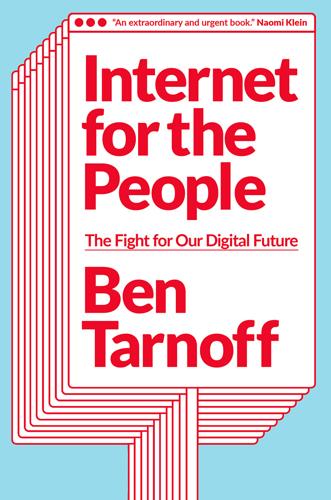
Internet for the People: The Fight for Our Digital Future
by
Ben Tarnoff
Published 13 Jun 2022
The internet is composed of distinct networks, but data travels easily across them because the networks share a common set of protocols. These protocols are open and nonproprietary: any network can join the internet so long as it follows the specified rules. Mastodon is an open-source software project that applies this principle to social media. Servers are independently run but interconnect through open protocols to form a federation. They can also talk to non-Mastodon servers within a broader ensemble of federations—the “Fediverse”—so long as those servers also use the same protocols. Mastodon resembles Twitter, but the Fediverse offers a range of other services, including those modeled after YouTube, Facebook, and Instagram.
…
This is a problem that cannot be solved online because it is not primarily an online problem. Still, a decentralized social media would be better designed to mitigate it. When the fascist social networking site Gab migrated to Mastodon, most of the servers that make up the Fediverse responded by blocking Gab. Because Mastodon is open-source, fascists are free to use it, but their communities can be quarantined. Decentralized social media moves “decision making out to the ends of the network, rather than keeping it centralized among a small group of very powerful companies,” explains writer Mike Masnick. Some ends of the network may be populated by toxic elements.
…
The fact that these protocols are open and nonproprietary is a direct consequence of the internet’s public origins. Privatization has pushed things in the opposite direction: online life increasingly takes place within monolithic enclosures where interactions are governed by secret and proprietary algorithms. “Protocolizing” social media would break the walls of these walled gardens, and turn them inside out. Public Programming Mastodon is not tiny. It has millions of users, and it’s far from the only experiment of its kind: a number of similar projects are being pursued across the “decentralized web” community. Still, these alternatives remain relatively niche in comparison to the offerings of the tech giants.
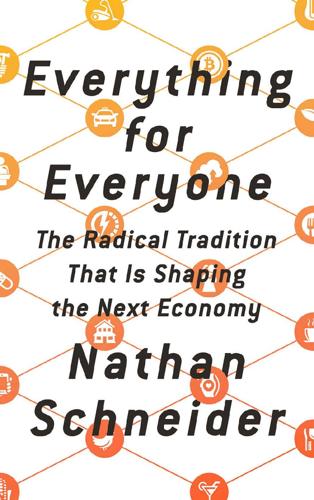
Everything for Everyone: The Radical Tradition That Is Shaping the Next Economy
by
Nathan Schneider
Published 10 Sep 2018
Jack Dorsey and other senior executives were there in the room listening. We won nearly 5 percent of the vote. That day another subgroup of #BuyTwitter, instigated by Vermont cooperator Matthew Cropp, announced the existence of Social.coop. It hosted a server for Mastodon, a new open-source, “fediverse” alternative to Twitter. Social.coop, as the domain suggested, was a cooperative managed by its users. Rather than being controlled by any one company, a federated social network like Mastodon is made up of interconnected nodes; users choose which node to trust with their data, and through the network they can interact with users on other nodes without everyone consigning everything they post to a central hub.
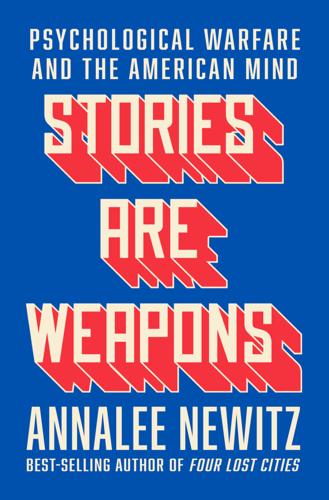
Stories Are Weapons: Psychological Warfare and the American Mind
by
Annalee Newitz
Published 3 Jun 2024
Information transit in the Fediverse works much like email, which also uses a protocol that sends your mail between, say, Gmail and Outlook. Posts on Mastodon rarely do a viral hockey stick because server operators choose whom they want to federate with, and they can block servers that are a source of misinformation. Even when servers are federated, posts don’t instantly appear on all servers at once. Indeed, some posts never leave their servers, while others hop across the Fediverse slowly, shared between individuals on different servers. Reading posts on Mastodon feels like Twitter in slow motion. Noble told me that social media companies could also put the brakes on sharing our data.
…
But she pointed out that “there are other kinds of slow business models in entertainment. It takes a long time to make films and shows—even journalism. There is some value in slow.”12 Her ideas are starting to catch on with former Twitter addicts who left the platform in the wake of Elon Musk’s takeover in late 2022. Many moved their accounts to Mastodon, a social media platform with some of the same features as Twitter but where posts don’t circulate as quickly. There are a few technical reasons for this. One is that Mastodon accounts aren’t all in one centralized location. Users open accounts on a specific server, often devoted to a particular interest like science or art, and these servers are federated with each other via a protocol that delivers posts from one to the next.
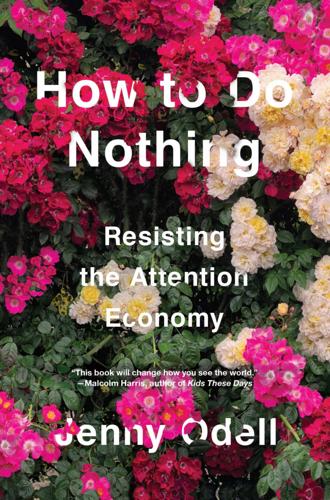
How to Do Nothing
by
Jenny Odell
Published 8 Apr 2019
As Oliver Leistert puts it in “The Revolution Will Not Be Liked,” for social media companies, “the public sphere is an historically elapsed phase from the twentieth century they now exploit for their own interests by simulating it.”16 * * * — WRITING IN THE ATLANTIC about a nascent decentralized network called Scuttlebutt, Ian Bogost gives us an image for this absurd situation: “Facebook and Twitter are only like water coolers if there were one, giant, global water cooler for all workplaces everywhere.”17 Dissatisfaction with this standard-issue water cooler has fueled the movement toward a decentralized web, which instead of private companies and servers makes use of peer-to-peer networks and open-source software. The goal is not only for users to own their own data, but to shift that data and software closer to their end points of use. Mastodon, for example, is a federated social network of “instances,” each using free software on a community-run server whose users can nonetheless communicate with those in other instances. As its creators point out, Mastodon can never go bankrupt, be sold, or be blocked by governments, because it consists of little other than open-source software.

Character Limit: How Elon Musk Destroyed Twitter
by
Kate Conger
and
Ryan Mac
Published 17 Sep 2024
And as he went out to try and fundraise, he would only create more chaos for himself. As the final wrapped up, with Argentina winning on penalties, Twitter announced a new policy that sent its users into a frenzy. “We will remove accounts created solely for the purpose of promoting other social platforms and content that contains links or usernames for the following platforms: Facebook, Instagram, Mastodon, Truth Social, Tribe, Nostr and Post,” the company announced on one of its official feeds. Musk had demanded the policy in an attempt to preserve traffic and stop eyeballs from going to other domains. He was particularly incensed by Dorsey, who had encouraged people to download and use Nostr, a new decentralized social network.
…
If a user happened to tweet a photo of Tom Cruise walking through the doors of a McDonald’s and tweeted the location, would they be banned under the new policy? The company not only banned @ElonJet, but other accounts that shared links to other sites with public flight data. That included the Twitter account for Mastodon, a competing social network that shared that people could find the @ElonJet account on their site, as well as more than half a dozen journalists at The New York Times, The Washington Post, and CNN, who reported on what was happening with the suspensions.[*] “They posted my exact real-time location, basically assassination coordinates, in (obvious) direct violation of Twitter terms of service,” Musk later tweeted, the wheels of conspiracy turning in his head.
…
* * * >>> Over time, the idea of Twitter itself splintered, just like the minds of the men who had tried their hands at running it. Twitter was no longer the only place where the world came together to discuss wars, news, or celebrity beefs. Instead, Twitter became a feature that one could find on nearly all social media services. On Instagram, tweets were Threads. On Substack, they were Notes, while Mastodon, the open-source platform that had inspired Musk to embark on a jealous crackdown, had toots. On Bluesky, to Graber’s chagrin, the community referred to their posts as skeets, a slant rhyme on tweets that also referenced ejaculation. One no longer had to be a part of Twitter to join the conversation—the conversation was now conversations, and they were everywhere.
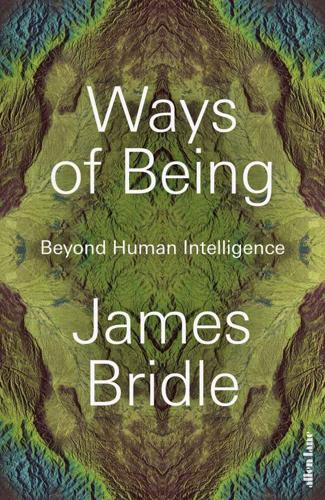
Ways of Being: Beyond Human Intelligence
by
James Bridle
Published 6 Apr 2022
For an introduction to open-source philosophy, see Lawrence Lessig, ‘Open Code and Open Societies: Values of Internet Governance’, Sibley Lecture at the University of Georgia, 16 February 1999; or, for a fictional account of its actual implementation, I recommend Cory Doctorow, Walkaway (New York: Macmillan, 2017). For examples of distributed processing initiatives, see https://setiathome.berkeley.edu and https://foldingathome.org/. The social networks Mastodon and Scuttlebutt, the Beaker web browser and Jitsi.org web conferencing are good examples of federated and peer-to-peer network projects. 35. For a description of the Optometrist Algorithm, see E. A. Baltz, E. Trask, M. Binderbauer, et al., ‘Achievement of Sustained Net Plasma Heating in a Fusion Experiment with the Optometrist Algorithm’, Scientific Reports, 7(6425), 25 July 2017; https://doi.org/10.1038/s41598-017-06645-7.
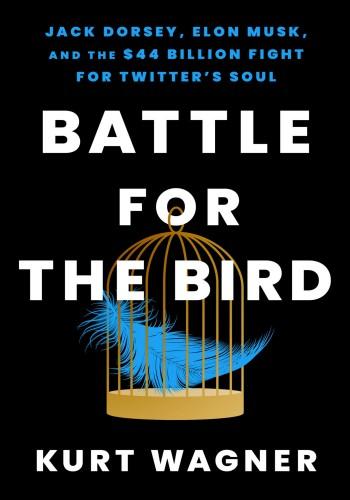
Battle for the Bird: Jack Dorsey, Elon Musk, and the $44 Billion Fight for Twitter's Soul
by
Kurt Wagner
Published 20 Feb 2024
Users mockingly pointed out that tweeting from the stadium meant he was inadvertently sharing his own “assassination coordinates.” As the match moved into extra time and eventually a shoot-out, one of Twitter’s main corporate accounts posted a series of tweets outlining another new policy: It was now against Twitter’s rules to post links to other social media sites, including Facebook, Instagram, Mastodon, and even Trump’s Truth Social. “We recognize that many of our users are active on other social media platforms,” read one of the tweets that was later deleted. “However, we will no longer allow free promotion of certain social media platforms on Twitter.” The uproar from Twitter users was both instantaneous and incredulous.
…
Any hope inside Twitter that Musk had spent the weekend reflecting on his own role in the company’s business demise was quickly shattered Monday morning. He woke up and tweeted two jokes about masturbation. “What do you call someone who is a master at baiting?” he posted, presumably drawing giggles from any teenage boys who followed his account. In another tweet he included a screenshot of Mastodon, a new competing social network that was having some technical issues, and wrote, “If you don’t like Twitter anymore, there is awesome site called Masterbatedon.” Either Musk didn’t see his own behavior as having any effect on the company’s advertising malaise, or he simply didn’t care. For Musk, shock-tweeting and pushing out controversy to his 115 million followers (the number was growing by the day) had long been the norm, but now he seemed to realize that his tweets were also driving considerable attention to Twitter.
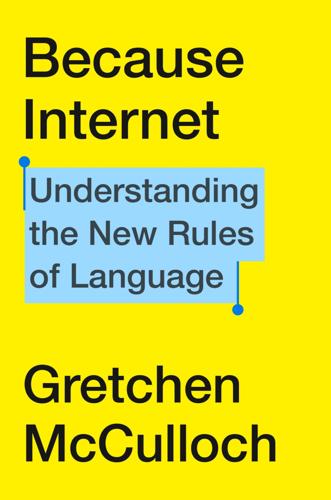
Because Internet: Understanding the New Rules of Language
by
Gretchen McCulloch
Published 22 Jul 2019
What the Old Internet People have in common is that they still probably conduct a fair bit of their social lives online, often having a long-standing pseudonym that they use everywhere and internet-first friends that they’ve known for longer than some of their meatspace friends. They’re the social internet users most likely to have never gotten or to have barely used Facebook, because for them the internet is a place to tap into a global community rather than reinforce a local one. (In the late 2010s, many of them started contemplating switching to Mastodon, a social networking platform with a decentralized, topic-based structure and a lack of user-friendliness which both recalled the early internet.) As the internet’s role in everyday life has matured, Old Internet People have become harder to distinguish unless you ask them. Depending on their age and who they hang out with online, some can be confused for one of their two neighboring cohorts, the people who came online in the next wave.
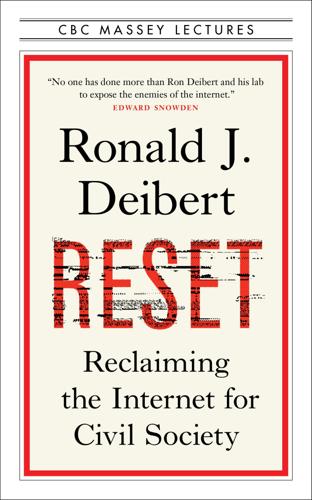
Reset
by
Ronald J. Deibert
Published 14 Aug 2020
Some believe that alternatives to social media that are not based on surveillance capitalism need to be promoted — encouraging the development of “civic media” as a “social” or “public” (instead of commercial) “good.”411 Indeed, there are several privacy-protecting search engines and social media platforms that do not organize their systems on the basis of personal data surveillance, such as DuckDuckGo and Mastodon. Some believe we should treat social media as “publishers,” or regulate them in the same way we regulate large utilities like electricity and water. Others believe that they should be broken up by using antitrust tools instead. Evaluating all these ideas can be difficult and confusing.
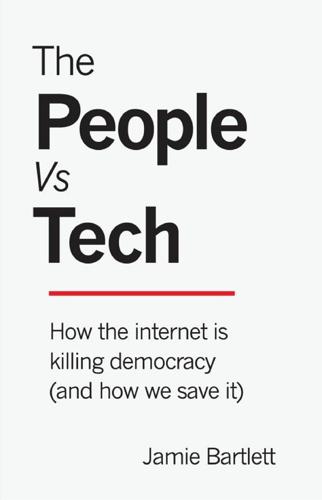
The People vs Tech: How the Internet Is Killing Democracy (And How We Save It)
by
Jamie Bartlett
Published 4 Apr 2018
Between 2011 and 2013 it processed over $1.2 billion worth of sales, mostly illegal drugs. Although Silk Road was eventually shut down, there are now several other dark net markets, where stolen personal data, narcotics and child abuse images can be bought and sold, Amazon-style. Let’s imagine a blockchain-based social media platform (there are already versions of this, like Mastodon, which is on the normal net), in which posts are simultaneously hosted on multiple decentralised blockchain databases. Facebook runs on servers that sit in massive data centres controlled by the company – meaning that it can delete or edit what its users see. A blockchain social media platform would be untouchable – no government would be able to edit or remove hate-speech, illegal images or terror propaganda, unless the whole network was somehow vaporised.

Filterworld: How Algorithms Flattened Culture
by
Kyle Chayka
Published 15 Jan 2024
I have hope for an Internet that’s more like Geocities, with expressions of individuality and customization everywhere, but with the multimedia innovations that have made the 2020s’ Internet so compelling. It would be a messier, more fun place—more like a playground or a sandbox than the cubicle office floor that the Internet has come to resemble. Open-source software like Mastodon, which allows its users to create and host their own Twitter-like social networks, provides one hint at what might be to come. But Mastodon also demonstrates some of the disadvantages of such different infrastructure. Audiences are smaller on self-hosted platforms, and interactions are more difficult. You might not be able to find any kind of content that you want.
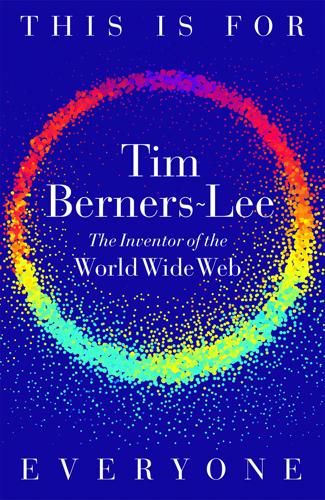
This Is for Everyone: The Captivating Memoir From the Inventor of the World Wide Web
by
Tim Berners-Lee
Published 8 Sep 2025
Nash ref1, ref2 digital commons ref1 digital divide ref1 Digital Equipment Corporation (DEC) ref1 digital signatures ref1 dishwasher poem (GPT-4) ref1 disinformation ref1, ref2 Ditchley Foundation ref1, ref2, ref3, ref4 DNS (Domain Name System) ref1, ref2, ref3 documentation systems ref1, ref2 documents compared to data ref1 doomscrolling ref1, ref2 dot-com bubble ref1, ref2, ref3 dot-matrix printers ref1 Doubleclick ref1 Dougherty, Dale ref1 Dow Jones ref1 Dropbox ref1 e-commerce ref1 E-Trade ref1 East Sheen, London ref1 ECMAScript ref1 Edelman, Richard ref1 Edelman Trust Barometer ref1 Edge ref1 Egypt ref1 eigenvectors 151n Elbaz, Gil ref1 electromagnets ref1 Electronic Frontier Foundation (EFF) ref1, ref2, ref3 Elizabeth II ref1, ref2, ref3, ref4 email ref1, ref2 Emanuel School ref1, ref2, ref3 encryption ref1, ref2, ref3, ref4 engagement, algorithms ref1, ref2, ref3, ref4 Engelbart, Douglas ref1, ref2 Enigma cipher ref1 ‘Enquire-within’ program ref1, ref2, ref3 Enquire Within Upon Everything ref1 equality ref1 Equifax ref1 error codes ref1 Erwise ref1 Eternal September ref1 Ethiopia ref1 Euler’s formula ref1 European Commission ref1 European Computer Manufacturers Association (ECMA) ref1 European Council for Nuclear Research see CERN European Semiconductor Equipment Company ref1 European Union Brexit ref1 GDPR (General Data Protection Regulation) ref1, ref2 Ex Machina (film, 2014) ref1 Excite ref1 Expedia ref1 Facebook advertisements ref1 Africa ref1 AI training ref1 Arab Spring ref1 collaborative filtering and polarization ref1, ref2 data breaches ref1 data ownership ref1 microtargeting ref1 users as the product ref1, ref2 facts, encoding ref1, ref2 farming ref1 Fediverse ref1, ref2, ref3 Fermilab ref1 Ferranti ref1, ref2, ref3 Ferranti, Basil de ref1 File Transfer Protocol (FTP) ref1, ref2 Filo, David ref1 Finland ref1 Firefox ref1, ref2 First Parish Church, Lexington ref1 Flametree ref1 Flanders ref1, ref2 Fora ref1 Ford Foundation ref1 Forth (programming language) ref1 forums ref1 Foster, Norman ref1 free speech ref1 Freud, Lucien ref1 Friendster ref1 Fry, Stephen ref1 Gal, Yarin ref1 Gallaudet University ref1, ref2 garbage in, garbage out ref1 Gates, Bill ref1, ref2, ref3, ref4 GDPR (General Data Protection Regulation) ref1, ref2 GEC ref1 Gemini ref1 generalization ref1 Geneva ref1, ref2, ref3, ref4, ref5 Geneva Amateur Operatic Society (GAOS) ref1 genome-sequencing providers ref1 Geocities ref1 geospatial mapping ref1 Ghana ref1 Gifford, David ref1 GIFs ref1, ref2 Gilliat, Bruce ref1 Gilmore, John ref1 Gilyard-Beer, Peter ref1 Glasswing ref1, ref2 Global News Network (GNN) ref1 Gmail ref1 Go (game) ref1, ref2 Gods of Literature ref1, ref2 Goldstein, Jono ref1, ref2 Google AJAX ref1 anti-trust lawsuits ref1 Applied Semantics purchase ref1 China ref1 Chrome ref1 DeepMind ref1 Gemini ref1, ref2 Gmail ref1 Google Docs ref1 Google Maps ref1, ref2 Google Meet ref1 hosted web anniversary dinner ref1 HTML and WHATWG ref1 passkeys ref1 search functionality ref1, ref2 standards ref1 start-up ref1 transformers ref1 users as the product ref1 Web Index ref1 Zeitgeist network event ref1 Google Maps ref1, ref2 Gopher ref1, ref2 Gore, Al ref1, ref2, ref3, ref4 government data ref1, ref2, ref3 governments and Contract for the Web ref1, ref2, ref3 GPS data ref1, ref2 GPTs (Generative Pre-trained Transformers) ref1, ref2, ref3, ref4 GPUs (Graphical Processing Units) ref1 Grail ref1 graph structures ref1, ref2 Great Firewall of China ref1, ref2 Greif, Irene ref1 Grisham, John ref1 Grok AI ref1 Grundy, Frank ref1, ref2 hacktivism ref1 Hall, Justin ref1 Halonen, Tarja ref1 Hanamura, Wendy ref1 haptic touch ref1 Harari, Yuval Noah ref1, ref2 Hardin, Joseph ref1, ref2, ref3 Harris, Kamala ref1 Harris, Tristan ref1 Harrison, George ref1 Harvard Berkman Klein Center for Internet and Society ref1, ref2 Institute for Rebooting Social Media ref1 Hassabis, Demis ref1, ref2 Hawke, Sandro ref1 Helsinki ref1 Helsinki University of Technology ref1 Hendler, Jim ref1 Herzberg, Frederick ref1 Heywood, Jeremy ref1 Hickson, Ian (Hixie) ref1, ref2 hierarchies ref1 Higgins, Eliot ref1 Higgs boson ref1 Higgs, Peter ref1 Hinton, Geoffrey ref1 holiday bookings ref1, ref2 Home Depot ref1 home pages ref1 Hoogland, Walter ref1, ref2 Hoschka, Philipp ref1, ref2 HTML (Hypertext Markup Language) ref1, ref2, ref3, ref4, ref5, ref6 HTTP (Hypertext Transfer Protocol) ref1, ref2, ref3, ref4, ref5 HTTPS standard ref1 human first systems ref1 human rights ref1, ref2, ref3, ref4, ref5, ref6 see also civil liberties humans as social animals ref1 HyperCard ref1 hyperlinks ref1, ref2, ref3, ref4, ref5, ref6, ref7, ref8 hypertext ref1, ref2, ref3 see also HTML Hypertext ‘91 conference ref1 Hypertext ‘93 conference ref1 Ibargüen, Alberto ref1 IBM, Watson ref1 identity theft ref1 IETF (Internet Engineering Task Force) ref1, ref2, ref3 images GIFs ref1, ref2 IMG tag ref1 PNG (Portable Network Graphics) ref1 Imitation Game, The (film, 2014) ref1 ‘Imitation Game’ (Turing) ref1, ref2 inclusivity ref1, ref2 India ref1, ref2 indigenous communities, land rights ref1 Industrial Revolution ref1 Inflection.AI ref1 Infosys ref1 infrastructure evolution ref1 INRIA (National Institute for Research in Digital Science and Technology), France ref1, ref2 Inrupt ref1, ref2, ref3, ref4 Instagram ref1, ref2, ref3 Institute for Rebooting Social Media ref1 integrated circuits ref1 intellectual property rights ref1, ref2 intelligence agencies ref1, ref2 intention economy ref1, ref2, ref3, ref4 intercreativity ref1, ref2, ref3, ref4 International Standards Organization (ISO) ref1 internet Al Gore funding bill ref1, ref2 blackouts ref1 deep web ref1 early development ref1 early functionality ref1 free ethos ref1, ref2, ref3 Map of Everything ref1, ref2, ref3 protocols ref1, ref2 size ref1 universal access ref1, ref2 see also World Wide Web Internet Archive ref1, ref2 Internet Explorer ref1, ref2, ref3, ref4, ref5 internet service providers (ISPs) ref1, ref2, ref3 interoperability ref1, ref2, ref3, ref4, ref5 Intuit ref1 invisible pixels ref1 IP addresses ref1, ref2, ref3 iPhone ref1, ref2, ref3 Iran ref1 ITT ref1 Jambon, Jan ref1 Java ref1 JavaScript ref1, ref2, ref3 Jitsi ref1 Jobs, Steve ref1, ref2, ref3, ref4, ref5, ref6, ref7 Jones, Peter ref1 JScript ref1 JSTOR ref1 Justin’s Links from the Underground ref1, ref2 Kagame, Paul ref1 Kahle, Brewster ref1, ref2 Kahn, Bob ref1, ref2 Kapor, Mitch ref1 Keio University, Tokyo ref1 Kendall, Alex ref1 Kenya ref1 killer apps ref1 Kirk, Anna ref1 Kirk, Matthew ref1 Knight Foundation ref1 Kotok, Alan ref1 Krotoski, Aleks ref1 Kubrick, Stanley ref1 Kunz, Paul ref1 Kurzweil, Ray ref1 labelling reality or fakes ref1 land rights ref1 LANs (Local Area Networks) ref1 Larkin, Philip ref1 Lassila, Ora ref1 Last.fm ref1 Le Corbusier ref1 LeCun, Yann ref1 Legal Information Institute (LII) ref1, ref2 Legg, Shane ref1 legislation Data Use and Access Bill ref1 GDPR (General Data Protection Regulation) ref1, ref2 mobile phone spectrum ref1 open data ref1 Leighton, Tom ref1 Leith, Rosemary (wife) Berkman Klein Center for Internet and Society ref1 investments ref1 marriage to Tim ref1 sailing ref1, ref2 visits Beijing ref1 web anniversary speech ref1 Web Foundation ref1, ref2, ref3 Lenat, Doug ref1 Lessig, Lawrence ref1 Lewin, Daniel ref1 Li, Angel ref1 liability of hosts ref1 Library of Alexandria ref1, ref2 Library of Congress ref1 LibreOffice ref1 Libya ref1 Lie, Hakon ref1, ref2, ref3 lifeloggers ref1, ref2 lists ref1 Literature, Gods of ref1, ref2 LLMs (Large Language Models) ref1, ref2, ref3, ref4 LocalFirst Community ref1 location data ref1 logic agents ref1, ref2 logic gates ref1, ref2, ref3 London 2012 Olympics ref1, ref2 Lovett, Adrian ref1 Lycos ref1 Lynx ref1 Ma, Jack ref1, ref2 Mac OS X ref1 MacArthur Fellowship ref1 McBryan, Oliver ref1 McCahill, Mark ref1 McCartney, Paul ref1, ref2 McCourt, Frank ref1 machine learning collaborative filtering ref1 neural networks ref1, ref2 see also artificial intelligence machine translation ref1 McManus, Richard ref1 MacWWW ref1 Malamud, Carl ref1 Mandelbrot ref1 maps geospatial mapping ref1 Google Maps ref1, ref2 Map of Everything on the Internet ref1, ref2, ref3 OpenStreetMap ref1, ref2 World Wide Web Middle Earth ref1 Marcos, Bongbong ref1 Markey, Ed ref1, ref2 Martin, George R. R. ref1 MasterCard ref1 Mastodon ref1, ref2 mathematics ref1, ref2, ref3, ref4 Matrix ref1 media industry ref1 mental health and social media ref1, ref2, ref3 ‘Mesh’ memo ref1 Meta ref1, ref2, ref3 see also Facebook metadata ref1 metasystems ref1 Metaverse ref1 Metcalf, Bob ref1 MeWe ref1 micropayments ref1 microprocessors ref1, ref2 Microsoft ActiveX ref1 Clippy ref1 Copilot ref1 copyright infringement ref1 early lack of browser ref1 Internet Explorer ref1, ref2, ref3, ref4, ref5 MS-DOS ref1 Office ref1 standards ref1, ref2 Teams ref1 XML ref1 Microsoft Exchange Server ref1 microtargeting ref1, ref2 Middle Earth ref1 Middle Earth map ref1 military applications ref1 Millennium Technology Prize ref1 Miller, Kaia ref1 Minnesota, University of ref1, ref2 misinformation ref1, ref2 MIT Center for Constructive Communication ref1 Computer Science and Artificial Intelligence Lab (CSAIL) ref1, ref2 speaking tours ref1 Tim Berners-Lee’s arrival ref1 Tim Berners-Lee’s early visits ref1, ref2 World Wide Web Consortium (W3C) ref1, ref2, ref3 mobile phones CSS (cascading style sheets) ref1 licences legislation ref1 touchscreens ref1 see also smartphones model railway ref1 modems broadband ref1 dial-up ref1, ref2 download speeds ref1, ref2 Moffat, John ref1, ref2, ref3 monopolization ref1, ref2, ref3, ref4, ref5, ref6 Montulli, Lou ref1 moon landings ref1 Moore’s Law ref1 Morsi, Mohammed ref1 Mosaic browser ref1, ref2, ref3, ref4 ‘The Mother of all Demos’ (Engelbart) ref1 motivation-hygiene theory ref1 Motorola ref1 Mount Stromlo Observatory ref1 Mozilla foundation ref1, ref2, ref3 MP3s ref1 Mubarak, Hosni ref1 multimedia ref1, ref2 Murthy, Vivek ref1 music collaboration ref1 copyright ref1 illuminated Italian Renaissance website ref1 MP3s ref1 recommendation services ref1, ref2 Tim Berners-Lee’s interest ref1 Musk, Elon ref1, ref2 MyData ref1 MySpace ref1 Myst (game) ref1 narrowcasting ref1, ref2, ref3 National Science Foundation ref1 National Theatre, London ref1 Naver Maps ref1 NCSA (National Center for Supercomputing Applications) ref1, ref2, ref3, ref4, ref5, ref6 Nelson, Ted ref1, ref2 neoliberalism ref1 net neutrality ref1, ref2, ref3 Netflix ref1, ref2 netiquette ref1 Netscape ref1, ref2, ref3, ref4, ref5, ref6 networking fractal ref1 humans as social animals ref1 neural networks ref1, ref2, ref3, ref4 URLs ref1 New York Times, The ref1, ref2, ref3 Newmark, Craig ref1 news organizations ref1 newsgroups ref1, ref2 NeXT ref1, ref2, ref3, ref4, ref5, ref6, ref7, ref8 NFT of original WWW code ref1 Ng, Andrew ref1 NHS ref1, ref2 Nigeria ref1 Nilekani, Nandan ref1 9/11 attacks ref1, ref2 Nix, Alexander ref1 Nobel Prize ref1, ref2, ref3, ref4 Nokia ref1 nuclear weapons ref1 Nupedia ref1 Nvidia ref1, ref2 Objective-C code ref1 Olympics, 2012 London ref1, ref2 Ong, Jonathan Corpus ref1 Open Data Institute (ODI) ref1, ref2, ref3, ref4 see also Solid open-source software ref1, ref2, ref3, ref4, ref5, ref6 Open Systems Interconnection (OSI) ref1 OpenAI ref1, ref2, ref3, ref4, ref5 OpenStreetMap ref1, ref2 Opera browser ref1, ref2, ref3, ref4 Opzoomer, Indi (Leith) ref1 Opzoomer, Jamie (Leith) ref1 Opzoomer, Lyssie (Leith) ref1 Order of Merit of the British Empire ref1, ref2 O’Reilly ref1, ref2, ref3 Oxford University ref1, ref2, ref3, ref4 PACER ref1 packet-switching ref1 Page, Larry ref1, ref2 PageRank ref1 pantomime ref1 ‘paperclip maximizer’ ref1 paradigm shift, artificial intelligence (AI) ref1 passkeys ref1 passwords ref1 patents ref1 peace ref1 Pellow, Nicola ref1 Penrose, Roger ref1 Pentagon ref1, ref2, ref3 Pets.com ref1 philanthropy ref1 Philippines ref1 photographs, metadata ref1 physics ref1, ref2 pi.ai ref1 Pinterest ref1, ref2 Pioch, Nicolas ref1 plagiary ref1 Plessey ref1, ref2, ref3 Plewe, Brandon ref1 PNG (Portable Network Graphics) ref1 podcasts ref1 PODS (Personal Online Data Stores) ref1, ref2, ref3, ref4, ref5, ref6 polarization ref1, ref2, ref3, ref4, ref5, ref6 Polis ref1 Pollerman, Bernd ref1 Polly, Jean Armour ref1 Poole ref1 Pordes, Ruth ref1 Postel, Jon ref1 Postscript language ref1 Priceline ref1 printers, dot-matrix ref1 printing presses ref1, ref2 privacy apps ref1 Contract for the Web ref1, ref2 data sovereignty ref1, ref2, ref3, ref4, ref5, ref6, ref7, ref8 location data ref1 MyData ref1 principle ref1, ref2 regulations ref1 RSA system ref1 Solid ref1, ref2 Prodigy ref1 programming languages ECMAScript ref1 HTML5 ref1 Java ref1 Objective-C ref1 Python ref1, ref2 Timpl ref1 Unix ref1 see also HTML Project Liberty ref1 protein-folding ref1, ref2 protocols CERN ref1 internet ref1, ref2 open ref1 see also HTTP; Solid provenance ref1 Prud’hommeaux, Eric ref1 public-key encryption ref1, ref2, ref3 punting ref1 Purnell, ‘Daffy’ ref1 Putz, Steve ref1 Python ref1, ref2, ref3, ref4, ref5 quantum mechanics 151n queuing theory ref1, ref2 Quicken ref1 Quint, Vincent ref1 Raggett, Dave ref1, ref2 RAGs (Retrieval-Augmented Generation systems) ref1 railway, model ref1 The Ranch ref1 Raytheon ref1 RDF (Resource Description Format) ref1, ref2 read–write web ref1 Readers ref1, ref2 RECAP ref1 Reddit ref1, ref2, ref3 religion ref1, ref2, ref3 retail sites ref1, ref2 Richmond Park ref1 Rimmer, Peggie ref1, ref2, ref3, ref4, ref5, ref6 Rivest, Ron ref1, ref2 Rogers, Kevin ref1, ref2 Rouse, Paul ref1, ref2 Royal Society ref1 RSA system ref1, ref2, ref3, ref4 RSS (Really Simple Syndication) ref1, ref2 running ref1, ref2 Rwanda ref1 Safari ref1, ref2 Sahel ref1 sailing ref1, ref2 Sainsbury’s ref1 Sandberg, Sheryl ref1 Sanger, Larry ref1 Sawadogo, Yacouba ref1 Scheifler, Bob 118n Schneier, Bruce ref1 schools ref1, ref2, ref3 science fiction ref1, ref2, ref3 Science Museum, London ref1 search engines ref1, ref2, ref3, ref4, ref5 see also Google Searls, Doc ref1 Second Life ref1 secure systems ref1 Segal, Ben ref1, ref2 semantic web Applied Semantics ref1 initial concept ref1 ‘layer cake’ ref1 machine learning ref1 PODS (Personal Online Data Stores) ref1 RDF (Resource Description Format) ref1 semantic winter ref1 Semantic Web Institute ref1 Sendall, Mike ref1, ref2, ref3, ref4, ref5, ref6 Seoul Peace Prize ref1, ref2 server software ref1, ref2 Sesri, Rudina ref1, ref2, ref3, ref4 SGML (Standard Generalized Markup Language) ref1, ref2 Shadbolt, Nigel ref1, ref2 Shamir, Adi ref1 Sheen Mount school ref1 Silicon Valley ref1, ref2 silos ref1, ref2, ref3, ref4 simplified text ref1 singularity ref1 Siri ref1, ref2 skiing ref1, ref2, ref3 Slack ref1 Slashdot ref1 slashdotting ref1 Smarr, Larry ref1 smartphones apps ref1, ref2 children ref1 global growth ref1, ref2 interoperability ref1 Smith, Adam ref1, ref2 Social Dilemma, The (film, 2020) ref1 social media addiction ref1, ref2, ref3, ref4 advertisements ref1, ref2, ref3 algorithms ref1, ref2, ref3, ref4, ref5, ref6 Arab Spring ref1 attention economy ref1, ref2 collaborative filtering and polarization ref1 early development ref1 Institute for Rebooting Social Media ref1 liability of hosts ref1 mental health ref1 mental health issues ref1, ref2 MeWe ref1 silos ref1 social graph ownership ref1 users as the product ref1, ref2 social trust ref1 software copyright development ref1 open-source ref1, ref2, ref3, ref4, ref5, ref6 Solid (Social Linked Data protocol) adoption ref1, ref2, ref3, ref4, ref5 Charlie ref1, ref2 development ref1, ref2 functionality ref1, ref2, ref3 Inrupt ref1 organization and structure ref1 potential ref1 Seoul Peace Prize ref1 server protocol ref1 trust ref1 see also PODS; data wallets Sollins, Karen ref1 Sony ref1 South Korea ref1, ref2 spiders ref1 Spotify ref1, ref2, ref3 Spyglass ref1 standards ref1, ref2, ref3, ref4, ref5 see also protocols; World Wide Web Consortium Stanford Linear Accelerator Center (SLAC) ref1, ref2, ref3 stock brokers ref1, ref2 Stoppard, Tom ref1 Stover, Mr (music teacher) ref1 style sheets ref1, ref2, ref3 Suleyman, Mustafa ref1, ref2, ref3 Sun Microsystems ref1 Sunak, Rishi ref1 superintelligence ref1 surveillance ref1, ref2, ref3, ref4, ref5, ref6 Swick, Ralph ref1 Switzerland ref1, ref2, ref3 T-Mobile ref1 tabulator ref1 tags ref1 Tahrir Square ref1 Taiwan ref1 TCP/IP ref1, ref2 TED talks ref1, ref2, ref3 teleconferencing ref1, ref2, ref3 teletypes ref1 television cathode-ray tubes ref1 closed captioning ref1 Telnet ref1 Tencent ref1 Texas Instruments ref1 text-to-speech services ref1 third-party distribution networks ref1, ref2 This Is For Everyone ref1, ref2 TikTok ref1, ref2 timbl ref1 Time magazine ref1 Timpl ref1 Tolkein, J.